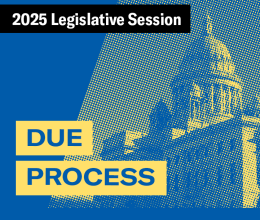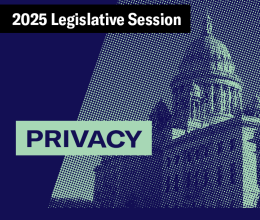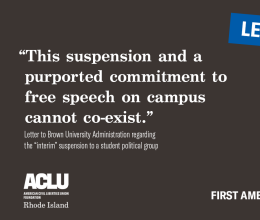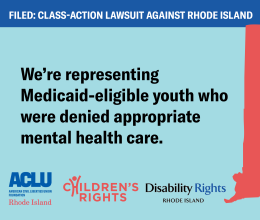While expressing “strong reservations” about its effectiveness, a Superior Court judge today upheld the constitutionality of a Providence ordinance that prohibits more than three “college students” from living together in certain areas of the city. The decision comes in a lawsuit filed two years ago by ACLU of RI cooperating attorneys Jeffrey L. Levy and Charles D. Blackman on behalf of the owner and tenants – four Johnson & Wales undergraduate students – of a house in the Elmhurst section of Providence. The City ordinance makes it illegal for more than three “college students” to live together in a non-owner-occupied single family home in certain residential areas.
The lawsuit argued that the ordinance is discriminatory and ineffective at its stated purpose of improving neighborhoods, and violated the plaintiffs’ rights to due process and equal protection of the law. In her opinion, R.I. Superior Court Judge Maureen Keough acknowledged “strong reservations concerning the effectiveness of an ordinance that restricts the number of college students who can reside in single-family homes as opposed to all others, or its ability to address the serious issues confronting communities in and around the Elmhurst neighborhood.” However, she said the ordinance was entitled to “minimal scrutiny” and a “highly deferential standard of review,” and that the City did not have to “present conclusive evidence that the amendment would fix all problems for which it was enacted” in order to pass constitutional muster.
Echoing many of the ACLU’s arguments, Judge Keough said she was
“skeptical that this amendment will serve its intended purpose . . . and quell the ever- increasing disturbances. As Plaintiffs correctly assert, the ordinance does not address the significant number of multi-family ‘party houses’ located in the same zones, which presumably are the biggest contributors to the ongoing issues. Moreover, the City has failed to articulate the evidence upon which it relies to support the conclusion that limiting the number of college students who can live together in a single-family home will correct the existing problems faced by the families living in the designated areas. . . Indeed, one would have to assume that four divinity students at the college who are busy pursuing their studies would be far more stable and less likely to contribute to any disturbances than four twentysomethings who have decided to forgo enrollment in any one of the City’s universities and instead play in a band, practicing at all hours of the day and night. Under his amendment, the former would be prohibited from cohabitating in the designated zones while the latter would not. This seems nonsensical.”
However, since the City’s position was “at least debatable,” the judge concluded, “it comports with constitutional requirements.
The ACLU lawsuit had also noted that there are already multiple ordinances in place to address noise, parties, traffic, and other possible nuisances. In challenging the ordinance’s discrimination against students “based solely on their occupation and/or educational status,” the suit further points out that “college student” is so broadly defined that it includes anyone enrolled in a college or university, whether they are a full-time undergraduate student, a PhD candidate, or a professional taking classes part-time.
ACLU volunteer attorney Levy said today: "I’m disappointed in the Court’s decision, because I agree with Judge Keough that the ordinance ‘seems nonsensical’ and is unlikely to be effective in controlling noise and other disturbances in Elmhurst. I continue to believe that the ordinance restricts the fundamental right to choose where one lives, and with whom. As a city, we should welcome and encourage college students as they pursue higher education, rather than treating them as second-class citizens."
ACLU of RI executive director Steven Brown said today: "Given the judge’s clear recognition of the questionable utility of this ordinance, we hope that the City will take this opportunity to reconsider its adoption of this ordinance."
The ACLU is considering appealing the ruling to the R.I. Supreme Court.
More information about the lawsuit, FHC v. City of Providence, is available here.







